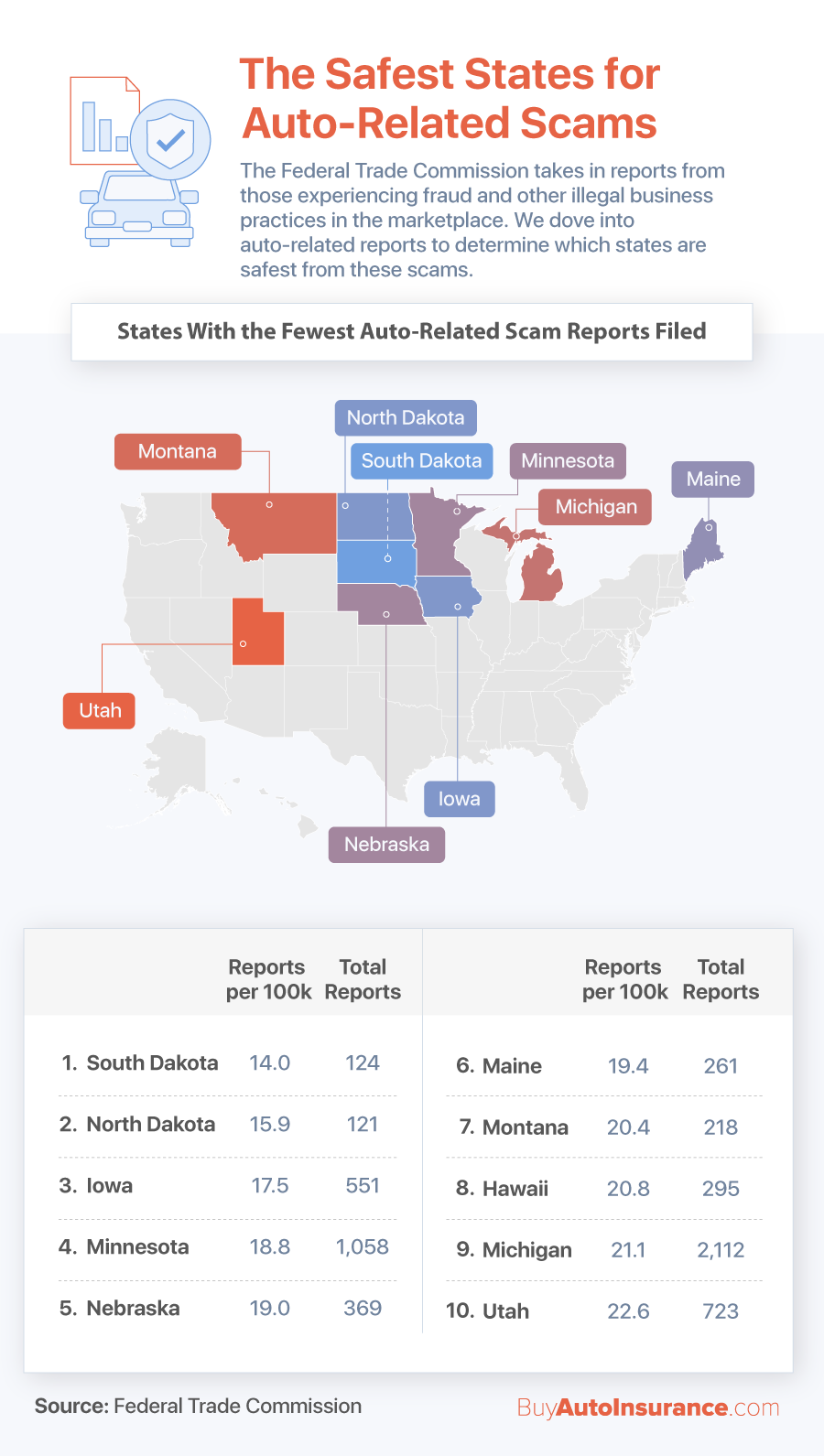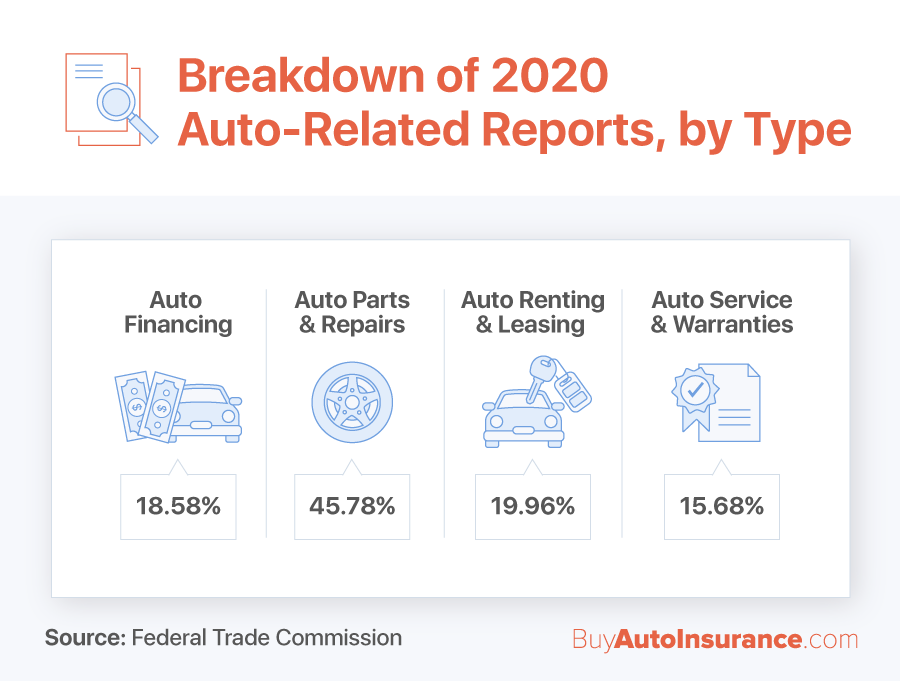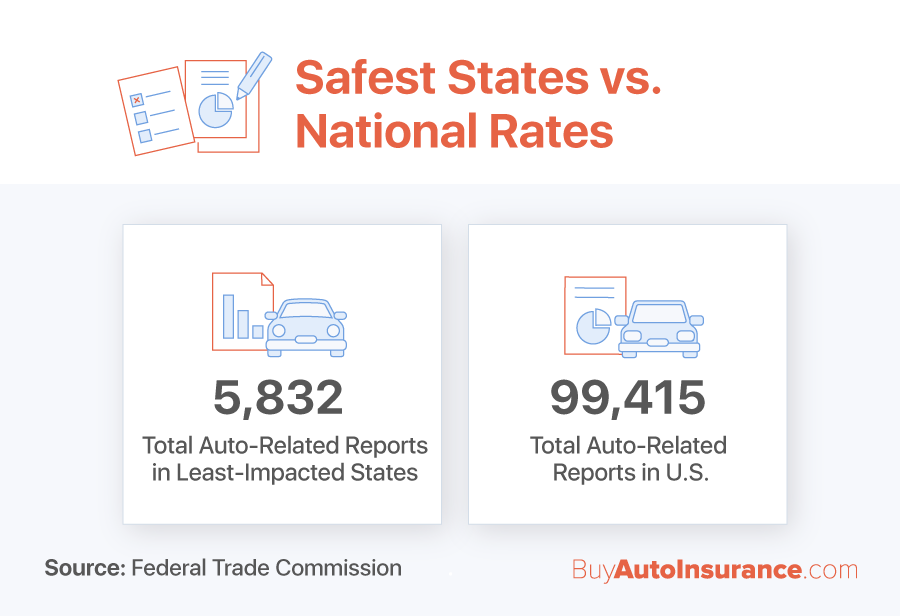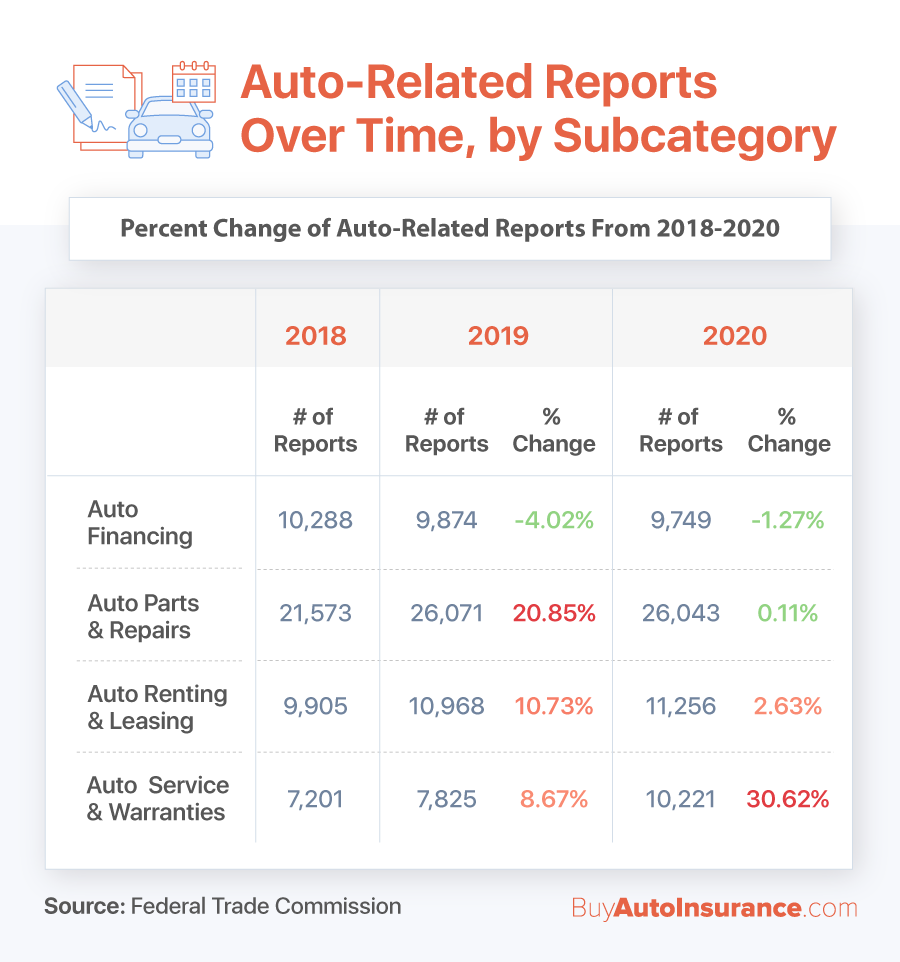10 States With the Fewest Auto-Related Scams: 2026 Findings
Auto-related reports included misleading claims about pricing, maintenance issues, and more. The 10 states with the fewest auto-related reports only averaged 19 reports per 1,000 residents. The total reports in the 10 best states equalled 5,832 out of the 99,415 reports in the U.S.
Michael Vereecke
Commercial Lines Coverage Specialist
Michelle Robbins has been a licensed insurance agent for over 13 years. Her career began in the real estate industry, supporting local realtors with Title Insurance. After several years, Michelle shifted to real estate home warranty insurance, where she managed a territory of over 100 miles of real estate professionals. Later, Agent Robbins obtained more licensing and experience serving families a...
Commercial Lines Coverage Specialist
UPDATED: Nov 10, 2023
It’s all about you. We want to help you make the right coverage choices.
Advertiser Disclosure: We strive to help you make confident auto insurance decisions. Comparison shopping should be easy. We are not affiliated with any one auto insurance provider and cannot guarantee quotes from any single provider. Our auto insurance industry partnerships don’t influence our content. Our opinions are our own. To compare quotes from many different auto insurance companies please enter your ZIP code on this page to use the free quote tool. The more quotes you compare, the more chances to save.
Editorial Guidelines: We are a free online resource for anyone interested in learning more about auto insurance. Our goal is to be an objective, third-party resource for everything auto insurance related. We update our site regularly, and all content is reviewed by auto insurance experts.
UPDATED: Nov 10, 2023
It’s all about you. We want to help you make the right coverage choices.
Advertiser Disclosure: We strive to help you make confident auto insurance decisions. Comparison shopping should be easy. We are not affiliated with any one auto insurance provider and cannot guarantee quotes from any single provider. Our auto insurance industry partnerships don’t influence our content. Our opinions are our own. To compare quotes from many different auto insurance companies please enter your ZIP code on this page to use the free quote tool. The more quotes you compare, the more chances to save.
On This Page
- South Dakota has the lowest rate of auto-related scam reports, with only 14 cases per 1,000 residents
- The 10 best states only made up 5.8% of the total U.S. auto-related scam reports
- The average number of auto-related reports in the 10 states with the lowest case numbers is 583
Scams are everywhere, from fake car accident claims on auto insurance coverages to purposefully misleading prices on car leases. In some areas, auto-related scams are worse than average, with thousands of people reporting auto-related scams to the Federal Trade Commission.
Luckily, if you live in one of the states with the fewest auto-related scam reports, you are less likely to be scammed out of your hard-earned money. The states on our list all have lower-than-average numbers of auto-related reports. We will also cover the following topics:
- Auto-related scam reports in the best states versus the U.S.
- Expert tips on how to avoid auto-related scams
- Frequently asked questions about auto-related scams
Read on to see if your state is one of the best states for auto-related scam reports.
10 States With the Fewest Auto-Related Scam Reports
To find the best states for auto-related scam reports, our researchers gathered the latest data from the Federal Trade Commission (FTC) and calculated the total number of auto-related cases.
In order to make sure the number of cases was relevant to the number of state occupants, our researchers used resident data from the Census Bureau to calculate the rate of auto-related cases per 1,000 residents. Take a look at the results for the 10 safest states below.
The 10 best states had a total of 5,832 auto-related cases reported over the span of nine months, which is low. The best state, South Dakota, only had 14 auto-related reports per 1,000 residents. This rate only increased to 22.6 for the 10th best state, Utah.
What kind of scams make up these auto-related reports? Take a look at the graphic below for a full breakdown.
Auto part and repair reports made up 45% of the total auto-related reports in the U.S. The second-highest category was auto renting and leasing. Auto service and warranties made up the lowest percentage of total auto-related reports.
To learn more about the 10 best states beyond what types of scams were reported, keep reading for more details on each state below.
#10 — Utah
- Auto-Related Scam Reports: 723
- Auto-Related Scam Reports Per 1,000 Population: 22.6
Utah has one of the lowest rates of auto-related scams. There were only 723 auto-related cases in nine months in Utah, which averages out to 80 cases per month.
Since there was a total of 25,304 total scam reports in Utah, auto-related reports only made up 2.8% of all reports.
#9 — Michigan
- Auto-Related Scam Reports: 2,112
- Auto-Related Scam Reports Per 1,000 Population: 21.1
Michigan ranks number nine on our list. There was only a rate of 21.1 auto-related reports per 1,000 residents, which is low. Overall, auto-related cases only made up 2.5% of the 83,517 total reports in Michigan over the nine-month period.
#8 — Hawaii
- Auto-Related Scam Reports: 295
- Auto-Related Scam Reports Per 1,000 Population: 20.8
Number eight on our ranking is Hawaii, with only 295 total auto-related reports. The overall rate of auto-related reports per 1,000 residents is only 20.8.
Since the total cases amounted to 11,901 in Hawaii, auto-related scam reports only made up 2.4% of reports in Hawaii.
#7 — Montana
- Auto-Related Scam Reports: 218
- Auto-Related Scam Reports Per 1,000 Population: 20.4
Montana has very few auto-related cases reported. With only 218 reports and a rate of 20.4 reports per 1,000 residents, Montana ranks number seven. Since there was only a total of 7,643 reports, auto-related reports only made up 2.8% of scams in Montana.
#6 — Maine
- Auto-Related Scam Reports: 261
- Auto-Related Scam Reports Per 1,000 Population: 19.4
Maine is number six on our list, with only 261 auto-related reports. This comes out to 19.4 auto-related cases per 1,000 residents, and less than 3% of all scam reports in Maine.
So, if you live in Maine, the chance of getting scammed is significantly less than in other states.
#5 — Nebraska
- Auto-Related Scam Reports: 369
- Auto-Related Scam Reports Per 1,000 Population: 19.1
Nebraska is number five on our list, as it only had a rate of 19.1 auto-related reports per 1,000 residents. With only 369 auto-related reports, auto reports only made up 3% of Nebraska’s 12,107 total scam reports. Of course, it is still important to stay alert to possible scams, as it may not just be insurance or dealership scams you have to deal with.
Anytime someone asks you for personal information, it’s important to verify that they are actually from a legitimate insurance or loan company.
#4 — Minnesota
- Auto-Related Scam Reports: 1,058
- Auto-Related Scam Reports Per 1,000 Population: 18.8
Minnesota is number four, as it only had a rate of 18.8 auto-related reports per 1,000 residents. While 1,058 auto-related reports may seem high, it only makes up 2.4% of Minnesota’s 43,329 total scam reports.
So as long as you do your research before buying a car or visiting a repair shop, you have a very low risk of getting scammed.
#3 — Iowa
- Auto-Related Scam Reports: 551
- Auto-Related Scam Reports Per 1,000 Population: 17.5
Number three is Iowa, with a rate of only 17.5 auto-related reports per 1,000 residents. With a total of 18,539 scam cases, 551 auto-related reports only contributed 2.9% to the total reports in Iowa. Of course, this doesn’t mean that there aren’t any auto scams in Iowa.
If a used car deal seems too good to be true in Iowa, it is probably a scam. So use caution when shopping for a car.
#2 — North Dakota
- Auto-Related Scam Reports: 121
- Auto-Related Scam Reports Per 1,000 Population: 15.9
North Dakota only had a total of 121 auto-related reports, making it the second-best state where you are least likely to fall victim to an auto-related scam. With a rate of cases averaging 16 per 1,000 residents, it ranks as number two of the best states for auto-related reports.
Since there were 4,497 reports, auto-related cases only made up 2.6% of total reports in North Dakota.
#1 — South Dakota
- Auto-Related Scam Reports: 124
- Auto-Related Scam Reports Per 1,000 Population: 14.0
The number one state where you are least likely to be a victome of an auto-related scam is South Dakota. It had the lowest rate of auto-related reports per 1,000 residents on this list — only 14 reports per 1,000 residents and 124 reports total.
With a total of 4,323 scam reports in South Dakota, auto-related reports only contributed 2.8% to the total reports.
Compare Quotes From Top Companies and Save
Secured with SHA-256 Encryption
Auto-Related Report Rates and Annual Changes
While we’ve taken a look at each of the best states individually, you might be wondering how they compare to the other U.S. states in general. Auto-related scam reports in the 10 best states only made up 5.8% of the U.S. total. Take a look at the total numbers below.
There was a total of 99,415 auto-related reports over the nine-month period of data in the U.S. The 10 best states contributed very little to this number.
As for auto-related reports in the U.S., there have been multiple decreases and increases in the different report types over a few years. The only type of report that consistently saw a slight decrease was auto financing. The full numbers are below.
Auto service and warranty reports saw the biggest increase in 2020, with a 30% increase in total reports. Reports for auto renting and leasing also increased steadily, with a 13% increase over two years.
To avoid being one of the customers filing reports or looking at reasons to sue a car dealership, do a little research before financing a car or visiting a repair shop. Phillip Villegas from ThreePedalMafia.com shares this advice on repair shops:
“You should know that replacing your brakes is one of the most prevalent upsells you might get from a repair shop. This is because nobody wants to drive a car that has bad brakes. Fear is employed to persuade you to purchase something you may not require.
Some might tell you, ‘If you have faith in your mechanic, don’t hesitate to replace the brake pads.’ However, if you don’t get along with the mechanic or this is your first time utilizing a certain repair shop, don’t be surprised if they propose new brake pads. This is the most commonly targeted upsell since the majority of clients will just say OK as it is a matter of safety.
You may feel more at ease when working with someone who has a professional qualification in their industry, just as you would with other professions.
The National Institute for Automotive Service Excellence (ASE) is a nonprofit organization that evaluates and certifies automotive workers. For automotive technicians, ASE certification involves two years of on-the-job training or one year plus a two-year degree, as well as passing the test. To keep your ASE certification, you must retest every five years.”
In addition to ASE certification, customers can also check an auto shop’s Better Business Bureau rating and customer reviews. These are good indicators of a company’s reliability. Similarly, researching a car dealership beforehand can help you determine how trustworthy a dealership is.
How to Avoid Auto-Related Scams
If you are worried about being scammed, we’ve collected advice from multiple experts on how to make sure you get a fair price on services, whether it’s buying a car or visiting an auto repair shop. Our authorities cover a wide range of specialties, from finance, insurance, mechanic experts, and more. Read on for their advice on how to avoid auto-related scams and what to do if you have been scammed.
How can drivers make sure they are getting a fair price when buying/leasing a new car?
“One of the best ways to ensure you are getting a fair price on a vehicle is by doing your research. Plenty of websites will show you vehicle pricing — you can even add on features to see the additional costs. Cross-reference some of these websites to make sure you have a good idea of the vehicle’s price and fair market value.”
What should car owners look for when trying to find a trustworthy auto repair shop?
“As a Lemon Law Attorney, I recommend that consumers take their vehicle to an authorized manufacturer dealership for repairs. If the vehicle is not under warranty, the consumer should do research on the auto body shop, such as by looking them up on Yelp and the Better Business Bureau.
Consumers should make sure the repair shop chosen has good reviews and is experienced in working with the specific subject vehicle.”
How can drivers make sure that the used car they are buying is not a lemon?
“When purchasing a used car, you can avoid a lemon by running a CarFax on the vehicle before making your decision. It’s best to consider a Certified Pre-Owned vehicle, as it will include a warranty and be certified by the seller.”
What are the main scams people fall for with car repair shops and/or car dealerships?
“The worst scam typically happens after people leave a shop or dealership with only a verbal estimate for the work that needs to be performed on their vehicle. Do NOT leave your car for repair work unless you are sure the work will be covered under warranty or someone has provided you with a written estimate.
You should also confirm that your mechanic will be using new parts for your repair. Used parts aren’t always bad—but they are if you’re paying a new part price.”
What actions should people take if they have been scammed?
“Depending on the way in which the consumer feels scammed, they should contact either a Lemon Law or Auto Fraud Attorney who is experienced and has a high success rate.”
Jessica Anvar is the founder of Lemon Law Experts.
She has fought for the rights of vehicle consumers for over a decade.
“The best way drivers can make sure they get a fair price when buying or leasing a new car is to compare prices. I recommend using the calculator on TrueCar.com or the Edmunds car comparison tool to compare prices.
By using the Edmunds Car comparison tool, you will be able to see the average price that people have paid for the same or similar car. This will help you determine if you’re getting a fair price and whether it’s on the high-end or low-end.
To make sure you use a trustworthy auto repair shop, you should consider using an auto shop that specializes in the brand of your car. Specialized auto repair shops like these are more likely to have the up-to-date equipment and tools necessary to fix your vehicle correctly.
When looking for a trustworthy auto repair shop, you should also verify that they are certified with the ASE.
Additionally, check the Better Business Bureau website to ensure they don’t have too many complaints. You should also do your research to find out what warranties they give on repairs.
The most common scam people fall for from unscrupulous car repair shops is being told their car needs work that they didn’t ask about.
For instance, if you bring your car in only for an oil change, a shady mechanic may recommend a cabin filter replacement. While cabin filters are important, it’s not a critical repair your car needs and shouldn’t be replaced because it’s a bit dusty.”
Caleb Reed is the founder of The Dollar Budget.
He is a debt-free personal finance expert.
“Research the fair market value of the car you want to buy or lease. The best way to make sure you are getting a fair price when buying or leasing a car is to do your research ahead of time. Know what the car is worth on the open market, and don’t be afraid to bargain with the dealer.
When looking for a trustworthy auto repair shop, it’s important to consider how long the shop has been in business, as well as what kind of reviews it has received. Checking with your local Better Business Bureau can also be helpful.
Get a CarFax report on the car you are buying to check for any past problems. A CarFax report can give you important information about the history of the car you are buying, including any past problems or accidents. This can help you decide if the car is worth the price you are paying.
Be aware of common car repair scams, such as charging for unnecessary repairs or parts or not completing the work that was agreed upon. Car repair scams can be very costly, so it’s important to be aware of the most common scams. Contact the local authorities or the Better Business Bureau if you think you might have been scammed.
If a car repair shop or dealership has scammed you, don’t hesitate to contact the local authorities or the Better Business Bureau. They may be able to help you get your money back or at least prevent others from being scammed in the same way.”
Daniel Chan is the CTO of Marketplace Fairness.
His site provides education on creating a fair marketplace.
“Auto fraud is quite common in the United States, and buyers need to ensure that they source their cars from verified suppliers who can provide additional benefits. Auto insurance and car integrity are important because they give drivers assurance of their safety and insurance in the event of any eventualities.
Finding vendors who provide after-sales services and critical insurance policies help drivers keep their cars and wallets safe.
An ASE (National Institute for Automotive Service Excellence) or AAA ( American Automobile Association) certification ensures that drivers get their money’s worth from reputable mechanics.
To find out if your mechanic is lying to you and taking advantage of your car woes, pay attention to these red flags: an endless cycle of never-ending repairs, the use of cheap spares, an insistence on unnecessary repairs, exorbitant pricing, and straying from the manufacturers manual to install unworthy parts.
When it smells fishy, it is fishy, and any discrepancy with what you expect should be investigated and verified as a legitimate action. If you are in doubt, it is advisable to get the opinion and diagnosis of an independent mechanic with nothing to lose when telling you just how mangled and in need of help your car is.
I once bought a car with new door panels that concealed years of rust and decay. Independent mechanics who can inspect your car are quite essential, and in the haste of getting a bargain, I did not engage one. Selling the car without investing more money in it was impossible, and it significantly reduced the fresh dollars I collected as profit.”
Jibran Qazi is an online marketing officer at My Canada Payday.
Streamlining the lending process, My Canada Payday is a loan portal.
“Researching competitive prices for car leases and buys makes it easier to recognize when you are being taken for a ride. Car yards are in constant competition, and offering customers proper pricing ensures that sales move at a profitable rate.
Before finding the right repair shop, look for recommendations from drivers with the same or similar cars as yours. Mechanics gain experience the more they work on a particular type of car, and many specialize in doctoring a specific favorite.
The Better Business Bureau and the Department of Consumer Affairs can help drivers determine the credibility of auto shops they want to visit. Convenience due to location may not be convenient in the long run as expenses from repeated repairs significantly reduce the profits you can obtain from a car.
Buy used cars from lots with a good reputation for legitimately bought cars with plates and valid logbook information.
When life gives you lemons, you make lemonade; any car is valuable as long as you get it for the right price. If you are looking for the best bargains, ensure you are aware of the exact condition of the vehicle you are purchasing.
Trust yourself to inspect any car before purchase; pop the hood, rev it up, look under the seats, look at the paint job, inspect every inch of the interior, and make sure to take it for a test drive.
If possible, ask for a vehicle history report to ascertain the exact model, year of making, and ownership history of your potential buy; you may find you have hit a mini-jackpot and found a true gem.”
Philip Westfall is a director of marketing at RVezy.com.
He is a tech enthusiast specializing in RV rentals.
How can drivers make sure they are getting a fair price when buying/leasing a new car?
“There are many websites and companies that do car inspection with several tools, and by the end of the inspection, they give you a competitive market price for your car. Another great way to get a fair price is to go to car selling sites and have a look at the price of your same model. You will get an idea about the fair price of your car.”
How can drivers make sure that the used car they are buying is not a lemon?
“Check to see if the catalytic converter is removed, and make them replace it if it is. There’s a law in the United States that you can’t remove the catalytic converter.
Also, you need to check the engine if it is leaking water or making black smoke. Check the exterior and interior of your vehicle, and check the suspension.”
What should car owners look for when trying to find a trustworthy auto repair shop?
“Good mechanics are hard to find in an industry where everybody is behind on money, but here are some of the points you should consider when going to a mechanic for your car:
- Good mechanics try to find out the specific problem rather than using a trial-and-error method. Avoid mechanics who suggest you replace the whole thing without knowing the problem.
- A good mechanic will have a certification that lets you see their level of expertise.
- If you got hit and had a broken bumper or lights, you will need a specialized mechanic to fix the issue. However, if you have scratches on the body of your vehicle or front door, you should go to an independent mechanic. Getting scratches repaired by an independent mechanic doesn’t affect your warranty.
- Check if the product they are sourcing has good reviews from the person who has already used it. Similarly, check the material used, quality, price, availability, and time used to fix it. You could ask about used products, and sometimes you can get the original product.
Finally, there are many platforms and websites available on the internet that you can call to ask for a free estimate or quote.”
What are the main scams people fall for with car repair shops and/or car dealerships?
“Sometimes people are phished or tricked by car owners into buying a faulty vehicle. You should consider paying a mechanic to perform a car inspection. It’s good to inspect a car with a trustworthy mechanic or with a person who is mechanically experienced.”
What actions should people take if they have been scammed?
“People should contact the state’s Attorney General’s office and file a complaint against the owner with the National Consumer League’s Fraud Center. If you gave them your personal information, you need to update your username and password right away. Be very cautious about your card activity.”
Maataaf Khan is the CTO of Sands Inn and Suites.
His site offers travel vacation packages.
“Feeling like you’ve gotten short-changed is a terrible feeling, especially on big purchases like cars. Here’s what you can do to prevent this.”
How can drivers make sure they are getting a fair price when buying/leasing a new car?
“Get multiple quotes from several dealerships. Not only will you find the cheapest one possible, but you’ll also be able to use that information to negotiate with other dealerships into bringing the price down.
You can put the quote ladder to use here and locate the highest and lowest quote on the same car. Go to the dealership with the highest quote, show them the lowest quote and ask them to beat that. If they do, go to the next dealership with the second-highest quote and show them your new quote. Do this until no one is willing to drive the price down further.
Consider ordering your car directly from your manufacturer. Not only can this save you from additional costs that the dealership is going to pass on to you, but you will have more choice in the make and color.
The dealership spends quite a lot of money on getting the car and then paying for insurance while the car is parked on its grounds. They pass this cost onto the customer, but they won’t if the car doesn’t have to be housed under their roof.
If you order your car, you’re not going to be spending on all the add-ons that salesmen at dealerships will try their best to convince you to. This may sound ridiculous, but so many people are swayed when they walk into a dealership, as the people there really know what they’re doing and how to hike the price up.
You save money when you order from a manufacturer, but pay in terms of lost convenience as you will have to wait a couple of weeks for your car.”
What should car owners look for when trying to find a trustworthy auto repair shop?
“The best way is to take your car in for something that it doesn’t need. An honest mechanic who knows what he’s doing will deny you service and tell you that your car is fine. A dishonest one will do it anyway, signaling that he’s not very good at his job or that he’s likely to overcharge you in the future.”
Anthony Martin is the CEO of Choice Mutual.
His company provides final expense insurance.
“According to the FTC, there are many auto-related scams occurring in the United States. These scams can be costly and devastating to the victims. In an effort to help protect consumers, the FTC has compiled a list of the states with the fewest auto-related scams.
What are the costs of auto-related scams?
Auto-related scams take many different forms, but all of them have one common goal: to steal your money.
In some cases, scammers will try to sell you a car that’s not actually available. Other times, they’ll try to get you to sign up for unnecessary auto repairs or services. And still, others will try to trick you into giving them access to your car or personal information.
The costs of auto-related scams are high. In fact, according to the National Consumers League (NCL), scam victims lose an average of $2,000 each time they fall victim to a scam. That means that, on average, scam victims lose more than $8 million every year!
Fortunately, there are ways that you can protect yourself from auto-related scams. You can be sure that any car sale you make will be through a reputable dealership – and never give out your personal information or car keys without first verifying the seller’s identity.
You can also be sure that any repair or service work you do is necessary and legitimate – and don’t let anyone pressure you into doing anything that you don’t feel comfortable doing.”
How can I avoid an auto-related scam?
“Auto-related scams are unfortunately common. Here are a few ways to avoid becoming a victim:
- Be skeptical of unsolicited email or phone calls that offer great deals on cars or services. These offers may be fake, and you could end up paying more than you intended.
- Follow the advice of car dealers and other reputable sources when buying a car. Check reviews online and make sure the dealership you’re considering has a good reputation. Don’t let yourself be pressured into making an impulse purchase, especially if you don’t have much experience buying cars.
- Use common sense when dealing with people who seem to want to take advantage of you in any way related to your car or driving skills. If something feels too good to be true, it probably is!
The FTC has compiled a list of the states with the fewest auto-related scams. By doing your research, you can avoid becoming a victim of an auto-related scam.”
Lianzhen Yang is the CEO of Pala Leather.
His company sells custom-made clothing.
“Finding a trustworthy auto repair shop can be tough, but there are certain warning signs to watch out for. In some cases, mechanics will use unnecessary parts and services to inflate the price of your bill. And if you’re buying a used car, it’s important to make sure you’re not getting ripped off.
Here are some steps people can take to protect themselves from getting scammed:
Avoid unnecessary repairs: Mechanics might suggest unneeded repairs in order to jack up the cost of your bill. If you don’t feel comfortable with the work being done on your car, you should find another mechanic that you trust.
Car owners should check their vehicle’s maintenance records and keep detailed notes about the condition of their vehicle. A good rule of thumb is that if an unexpected repair costs more than $100, it’s best to get a second opinion from another mechanic.
Make sure you got a fair price: Drivers should look out for price gouging or “bait and switch” tactics when buying or leasing a new car. For example, they might be lured into buying a car by an advertisement that says ‘$0 down,’ only to find out that there’s a catch — like high-interest rates or hidden fees.
In California, vehicle buyers might be asked to send money before they take the vehicle. One scam involves buyers being asked to pay with cashier’s checks or wire transfers. Once the buyer sends money for the vehicle and the seller sends proof that the car has been sold, the buyer never receives their car and loses both their money and their car.
In Hawaii, many cases involve vehicles being purchased and shipped from other countries such as Japan, England, Germany, and Australia. The seller will offer a great deal on an exotic car that would be hard for local buyers to find elsewhere at a bargain price. This can make buyers more willing to ignore red flags, making it easier for them to get scammed.”
Mark Surprenant is the General Manager at BPKC.com.
Bennett manufactures shipping supplies, retail displays, and more.
“There are a number of things you can do to protect yourself, starting with getting all the prices in writing. Most people don’t bother to get estimates on parts and repairs, but they should. If the shop says it needs to replace an engine and the owner says, ‘I’ll give you a good deal on it,’ walk away.
But what if you were dealing with a larger dealership? The Federal Trade Commission (FTC) recommends that consumers check out the Better Business Bureau’s website for any complaints. The National Automobile Dealers Association (NADA) also has an accreditation program that helps consumers find reputable car dealerships.
People should also check the vehicle history reports from services like Carfax and AutoCheck. These will help people make sure cars weren’t reported stolen or salvaged in a previous accident. If someone is buying from a private party, they should have a mechanic check it out before handing over any money.
If someone does end up getting scammed, there are ways to get help. The FTC has resources for people who have been ripped off by fake auto repair shops or car dealerships.
The top three states for auto fraud are the following:
- California
- Florida
- Texas
These states have a high population of people with the skills to pull off auto fraud. They also have a high rate of insured vehicles, and those insured vehicles are expensive. What’s the best way to protect yourself against auto fraud? Get your vehicle checked out by an independent mechanic before you buy it.
If you’re buying a used car, get a used car inspection from a licensed mechanic. You can also check out the VIN on the dashboard from a dealership that sells legitimate cars. The VIN number will be etched into the dashboard and won’t have any scratches or cracks on it. It will also match up with the VIN number on the title and registration.
If you find a shady dealership offering to sell you a car for less than its blue book value, then you might want to reconsider your purchase because there’s probably something wrong with their business practices.”
Mario Cacciottolo is the head of PR for SBO.net.
He is a former BBC reporter who loves to travel.
How can drivers make sure they are getting a fair price when buying/leasing a new car?
“To get the best price, you want to walk into the dealership knowing certain information, such as the vehicle MSRP or Manufacturer’s Suggested Retail Price. The MSRP is set by the manufacturer and serves as a good starting point for negotiations. You should also know the dealer invoice price or how much the dealership paid for the car.
The price that you pay should be in between these two numbers.
You also want to be prepared to walk out of a dealership if you’re not getting a fair price. Don’t fall victim to your desire to drive away in a new car. It’s well worth your time to walk away and check the price at a competing dealership or go home and do some more research before you pull the trigger.
Websites like Consumer Reports, Edmunds, and Kelley Blue Book are great resources to find out what you should pay and if there are any known problems with the make, model, and year that you are looking at.”
What should car owners look for when trying to find a trustworthy auto repair shop?
“The number one way to find a good repair shop is through word of mouth. If someone you know has had good luck with a certain mechanic, they’re much less likely to rip you off. If possible, mention that your friend referred you. A repair shop is much more likely to treat you right if they risk losing two customers rather than one.
Always check out a repair shop’s online reviews before you go. Bad reviews are an obvious red flag, but so are repair shops that have dozens of positive reviews and nothing negative. This could be a sign that they are manipulating their score with fake reviews.”
How can drivers make sure that the used car they are buying is not a lemon?
“Research, research, and more research. You can start by looking at the make, model, and year. If the car is a year old or older, there should be plenty of information online that can help you determine if the year and model is a lemon or if it is a good purchase.
Websites like CarComplaints.com are great because they compile data from user complaints in a way that is easy to read and understand. You can quickly determine the most common problems with that make, model, and year.
From there, you can narrow it down to the specific car you’re looking at using the VIN number. Ask the dealership to print out the Carfax, which will give you information about previous accidents, flood damage, or anything that could impact the life of your car. If the vehicle was in a serious accident, you might want to look at other options.”
What are the main scams people fall for with car repair shops and/or car dealerships?
“One of the most common scams is for a repair shop to lure you in with a cheap oil change or discounted basic service. Then once they have your car, they mysteriously find parts that need to be fixed or replaced. Since a majority of drivers don’t know enough about repairs to tell the difference, they end up overpaying or replacing parts that are perfectly fine.
Another popular scam is when a repair shop fixes your car with used parts but charges you for brand new parts and pockets the difference. While there is nothing wrong with fixing your car with used parts, you want to know exactly what you’re getting, and you certainly don’t want to pay the new rate for a part that has already been driven for thousands of miles.
When replacing a part, ask the repair shop for the receipt for the part that is being replaced. This way, they can’t hide where the part came from or if it was used or new.”
What actions should people take if they have been scammed?
“The first thing that you should do if you’ve been scammed is to contact whoever owns or manages the repair shop or dealership. If you state your case to management, they may agree that their service technician or salesman was being misleading and will work with you to get the situation straightened out.
Between social media, online reviews, and BBB complaints, you have more leverage than you think.
If the mechanic or dealer doesn’t budge, look into contacting your state’s Division of Consumer Affairs. Many states have lemon laws that will protect you from buying a new or used car that breaks beyond repair.”
Do you have a personal auto fraud story to share that could help someone else?
“A few years ago, I purchased a used 2012 Acura TL, which ran great but burned through oil very quickly. Less than two weeks after an oil change, I checked my oil and found that it was almost completely dry.
My repair shop had me convinced that I needed to replace a gasket inside of the engine, which was an inexpensive part but would have cost a ton for labor. I had a feeling I should get a second opinion, so I took the car to a friend of mine.
Since the car had well over 100,000 miles, he recommended adding extra oil myself between oil changes instead of paying a fortune for a small part that may not even solve the problem. Moral of the story: always get a second opinion.
Most states have lemon laws that protect you from serious defects that cannot be repaired. The advantage of lemon laws is that you can file without spending money on a lawyer. Some states, like New Jersey, even have lemon laws for used cars. There are limitations for what is covered, but they can still protect you from buying a car that quits right after you drive it off the lot.”
Parker Horveath is a parts expert with My Auto Store.
My Auto Store sells used auto parts.
Getting a Fair Price
“There are a few simple rules about pricing for a new or used car. The first is obvious: for used cars, check the Kelley Blue Book value of the vehicle before you shop around for a car. However, the dealer also knows the Blue Book value and likely will price their vehicles accordingly.
The other is to do research, particularly when buying a new car. The internet has a wealth of reviews and information about specific makes, models, and trim packages. Finally, don’t fall in love with a car. And, if you do, don’t make it obvious. Salespeople know when they have someone hooked, and they will try to get you to pay top dollar. Be ready to walk away.”
Avoiding a Lemon
“Many states have tough ‘no lemon’ laws for car dealers. These state laws provide consumers with legal recourse following the purchase of a vehicle that is defective and still under the manufacturer’s warranty.
The top four states with tough lemon laws are New Jersey, Rhode Island, Washington, and Hawaii. Some states have very weak laws. The bottom four states are Missouri, Louisiana, North Dakota, Colorado, and Illinois.”
Avoiding Repair Shop Shenanigans
“Repair shops have very low-profit margins. It’s in their best interest to increase their fees to avoid any shortfalls. Simple repairs and maintenance — like oil changes — are not money-makers for mechanics. That’s why there is such great temptation for mechanics to overcharge.
Some scams to watch out for include; ‘wallet-flushing,’ when a simple oil change or coolant flush turns into a full system flush with additional costs; ‘gravy work,’ which refers to mechanics ‘padding’ labor hours to increase their profits; and the dreaded ‘idiot light,’ the check engine alert that makes drivers nervous and mechanics drool over unnecessary work.”
Robert Walden is the founder of Vehicle Freak.
His site provides vehicle maintenance and buying advice.
How can drivers make sure they are getting a fair price when buying/leasing a new car?
“Do your research. Before buying a new car, drivers should research what others pay for comparable vehicles.
Drivers can also get information about current dealer incentives (special offers) to reduce the price of the car. There are many websites and publications where consumers can research the best price for a new car. Many of these will provide estimates based on geographical location, make and model. Finally, always ask about the final price for the cost of insurance.”
What should car owners look for when trying to find a trustworthy auto repair shop?
“Car owners should look at the quality of the work.
A trusted auto repair shop will be honest about the service that your vehicle requires and ensure customers are educated on each step of maintenance. Reputable shops also back up their work with guarantees for both parts and labor.
Some workshops are cheap because they push customers to use cheaper parts, which saves them money at the expense of your car’s performance and reliability over time. A trustworthy repair shop will suggest quality parts with a fair price point. If high-quality components are out of your price range, they should be able to show you options that will fit within your budget.”
How can drivers make sure that the used car they are buying is not a lemon?
“Get a CarFax report. The first step to buying a used car is getting the service history of that vehicle. This report will offer information on past accidents, odometer readings, and even details about specific problems that have occurred with that vehicle. The more information the driver has, the easier it will be to determine whether or not this is a solid purchase.”
What are the main scams people fall for with car repair shops and/or car dealerships?
“There are many different auto shop scams, but they all usually center around one thing — convincing customers to pay for unneeded repairs. One common scam is telling drivers their tires need to be replaced when there is nothing wrong with them. Other shops perform a simple repair but bill the driver for a more expensive one.”
What actions should people take if they have been scammed?
“A good way to avoid scams is going in with a list of car problems and having it ready when you arrive at the shop. This will ensure that all repairs needed are performed properly and within your budget.”
What actions should people take if they have been scammed?
“If drivers discover they have been scammed with unnecessary repairs, the best thing to do is return to the shop and ask for a refund. A reputable company will agree to this request.
It is also wise to contact your local Better Business Bureau (BBB) or Consumer Affairs office to file a complaint against that particular business. This can help warn other consumers about potential fraud in the future.”
Cody Crawford is the co-founder of Low-Offset.com.
He is an entrepreneur and vehicle enthusiast.
What should car owners look for when trying to find a trustworthy auto repair shop?
“Car owners should look for referrals. Don’t bother to ask a fellow car owner who has been regularly going to a good and trustworthy auto repair shop. Depending on your satisfaction level, that shop may become your trustworthy repair shop, but the best thing to do is to ask your families, relatives, or friends who own a car and have a good experience with the repair shop.
They will provide you with the best advice around your local area.”
How can drivers ensure that the used car they are buying is not a lemon?
“Check the vehicle history.
The best way to know that the used car you are buying is not a lemon is to check out the vehicle history by yourself. Do not depend on the sellers’ information only; find the previous owner and ask them personally through a message or email why they took the opportunity to sell the car.
Get as much information as possible. Paid services like CARFAX can provide you with enough information about your vehicle. All you have to do is to run the VIN (Vehicle identification number). CARFAX will let you know even if there was an inch of liens on the car, including any minor or major accidents.”
What are the main scams people fall for with car repair shops and/or car dealerships?
“A big scam is if you are not allowed to get your old or damaged parts returned.
It is your legal right to get your old and damaged parts even if they are beyond repair. But you’ll find many dishonest mechanics of car shops who are removing or replacing your old or damaged parts but wouldn’t return them. Instead, they use them for their own cause without benefiting you.
The worst part is that they will not even share any information regarding that part. Sometimes those parts could be made workable again through some certain work, but they will deprive you of the information and use that part for their own purposes.”
Adam Grant is the founder of Car Fuel Advisor.
He has over 10 years of experience in the automotive industry.
What is an auto-related scam?
“The auto industry is one of the most lucrative and competitive industries in the world. It is also no secret that auto-related scams are constantly evolving and targeting consumers at every turn.
Auto-related scams are those scams that involve people trying to take advantage of someone because they own or are in possession of an automobile.
These scams can come in many different forms, but the most common is when someone tries to sell them a car that is not actually available for sale, or when they try to get money from the victim by promising to fix their car or by claiming to have found a car that the victim was looking for.
Another common auto-related scam is when someone tries to get money from the victim by promising them a job as a mechanic or a salesperson for a dealership, only to then steal their identity and take all of their money.”
How do auto-related scams work?
“Auto-related scams are a common problem in the United States and many other countries. They work by scammers convincing people to give them money or goods in exchange for not filing a lawsuit or reporting the scam to authorities.
These scams can be difficult to spot because they often involve people who seem like they are trustworthy.”
What are the consequences of an auto-related scam?
“Auto-related scams are frustrating and can be costly. Here are some consequences of being scammed in this area:
- Financial damage: Victims of auto-related scams can lose money on car repairs, replacement vehicles, and other expenses.
- Personal anguish: Scammers can cause emotional distress by tricking people into believing they’ve won a prize or that their personal information has been compromised.
- Stressful experiences: Victims of auto-related scams may feel stressed out, anxious, and scared. This can have a negative impact on their quality of life and career.
It is important to be aware of the various auto-related scams that exist. If you are ever victimized by one, be sure to report it to the appropriate authorities.”
Melanie Cohen is the co-founder of BrandLists.com.
Their company provides auto part info and listings.
The States with the Fewest Auto-Related Fraud and Scam Reports
“According to a study by the National Fraud Information Center, over 2,000 auto-related fraud and scam reports were filed in 2015. Of these, the majority were filed in states in the Midwest and South.
Auto-related fraud and scam reports do not always indicate a high incidence of these crimes. Some states with fewer auto-related scam reports may have lower incidences of these crimes. To identify the states with the fewest auto-related fraud and scam reports, we analyzed data from the National Crime Information Center (NCIC) between 2008 and 2016.
Our analysis revealed that Wyoming had the fewest auto-related fraud and scam reports during this time frame. Only 0.54 percent of all NCIC data during this period mentioned an auto-related fraud or scam in Wyoming. This is significantly lower than the national average of 2.92 percent.”
The Factors That Lead to More Auto-Related Fraud and Scam Reports in Some States
“Auto-related fraud and scam reports are on the rise in some states. Many factors lead to fewer auto-related fraud and scam reports in some states. These include proactive law enforcement, adequate consumer protections, and a robust economy. Additionally, specific populations may be more likely to report fraud or scams involving autos than others.
For example, older adults may be more likely to experience fraud or scams related to car ownership than younger adults. Additionally, residents of rural areas may be less likely to experience auto-related fraud or scam reports than residents of urban areas.
While no state is immune to auto-related fraud and scams, it is important to remember that many factors can influence the number of reports filed in a given state.”
Anup Kayastha is the owner of AutoLoanCalculator.net.
He studies auto fraud and other factors that increase interest rates.
“It is no secret that the automotive industry is plagued by scam reports. However, there are a few states that have fewer auto-related scam reports than other states.
Auto-Related Scams
Auto-related scams generally involve fraudulent schemes in which someone attempts to fraudulently induce someone else into buying or signing up for a car, motorcycle, boat, or another vehicle. The scammer may pose as a salesperson from a legitimate dealership or may claim to be affiliated with a car financing company.
The victim may be asked to make an out–of–pocket payment for the vehicle before receiving it or maybe promised significant discounts on the purchase price if they pay in advance.
In some cases, the victim’s personal information (such as their address and credit card number) may be stolen in order to perpetuate the scam.
Auto-related scams are particularly common in states with large numbers of automatics such as California, and Florida, but they occur anywhere there is a high demand for vehicles and an opportunity for fraudsters to exploit vulnerable people.”
What are the states with the fewest auto-related scams?
“Auto-related scams are on the rise, with victims losing millions of dollars every year. To help protect consumers from these types of scams, the Federal Trade Commission (FTC) has created a list of states with the fewest auto-related scam reports.
The states on the FTC’s list have lower rates of auto-related scam activity than states that rank higher on the list. This suggests that there are measures in place to prevent auto-related scams from happening in these areas.
Some common measures taken to prevent auto-related scams include government oversight, strong consumer protection laws, and a robust anti-fraud infrastructure. By working together to create these safeguards, we can all help keep our communities safe and protected from fraudulent activities.
The automotive industry is plagued by scam reports. However, there are a few states that have fewer auto-related scam reports than other states. This is likely due to the fact that these states have a smaller population and are therefore less likely to be targeted by criminals.”
James Brooks is the CEO of CostumesHeaven.com.
His company provides custom-made costumes and apparel.
What should car owners look for when trying to find a trustworthy auto repair shop?
“When considering a new auto repair shop, you should search online for repair shops near you and then take the time to review all the available options. In most cases, I recommend that you go for a provider with a professional workshop, a consistent inflow of clients, transparent policies, and who has been in business the longest.
The last factor is especially important because if the service provider’s customers hadn’t been satisfied all those years, then chances are they would have closed down a long time ago. This will help you to avoid visiting an auto shop that may end up scamming you.”
How can drivers make sure that the used car they are buying is not a lemon?
“You should always conduct a thorough inspection of the vehicle inside, and if you aren’t sure what to look for, you can always bring or hire someone to come with you that has more experience with cars than you do, like a mechanic. You should also ask for the vehicle history report, which will help you to learn more about the history of the used car.
Moreover, it also pays to get a feel for the car before you buy it by taking it out for a test drive, allowing you to sense if it has any problems that may influence your decision to purchase it.”

Kathleen Ahmmed is the co-founder of U.S. Car Junker.
She is an automotive business owner and expert.
“When buying a new car, it’s important to do your research and compare prices. There are several websites that allow you to search for cars and compare prices, such as Edmunds.com and Kelley Blue Book.
It’s also important to consider the cost of ownership. Factors to consider include depreciation, fuel economy, repairs, and insurance premiums.
If you’re leasing a car, be sure to read the lease agreement carefully and ask questions about any penalties or fees that may apply. Lease agreements can be complex, so it’s important to understand all the terms before signing anything.”
What should car owners look for when finding a trustworthy auto repair shop?
“In many states, when you buy a used car, the law requires the seller to provide you with a ‘Lemon Law’ notice. This notice will tell you about your state’s Lemon Law and your rights as a consumer.”
How can drivers make sure that the used car they are buying is not a lemon?
“The Lemon Law is a law that protects consumers who buy or lease cars that turn out to be lemons—cars that have serious mechanical problems and are not fixed after a reasonable number of attempts. If you have problems with your car that the dealer can’t or won’t fix, the Lemon Law may give you the right to return the car and get your money back.
If you don’t receive a Lemon Law notice from the seller, ask for one.”
What are the main scams people fall for with car repair shops and/or car dealerships?
“One of the most common scams is when a car dealer tells the customer that their car needs a new engine or other major repair and tries to sell them a new car instead.
Other scams include charging for unnecessary or overpriced repairs, failing to perform necessary repairs, or performing substandard repairs. It’s also common for shops to charge customers for parts and labor that were never actually used.
One way to protect yourself from these scams is to get a second opinion on any major repairs that are proposed. If you end up having work done at a shop, be sure to get an itemized receipt with the cost of each part and each labor charge clearly listed.”
What actions should people take if they have been scammed?
“If you have been scammed by a fraudulent auto service repair, there are a few things you can do:
- Report the scam to your state’s Attorney General’s office.
- File a complaint with the Federal Trade Commission (FTC).
- Contact your local Better Business Bureau (BBB).
- If it occurred online, report the scam to the website’s hosting company and/or FraudWatch International.
- If you paid with a credit card, dispute the charge with your credit card company.
Unfortunately, there is no one ‘silver bullet’ solution that will get your money back or punish the scammers. However, by using these resources, you can increase the chances of getting your money back and stopping these criminals from scamming others.”
John Espenschied is the owner of Insurance Brokers Group.
He has over 20 years of experience in personal and commercial insurance.
Methodology: Finding the Safest States for Auto-Related Reports
In order to determine which states have the least auto-related reports, our researchers pulled the latest 2021 data from the FTC that was released in 2022. Our researchers calculated the number of auto-related cases by state using the percentages and scam case numbers over the three-quarters of annual data provided by the FTC.
In order to make sure the numbers took into account the number of residents per state, our researchers calculated the rate of cases per 1,000 residents. They pulled resident data from the United States Census Bureau to do this. Using the resident data and the number of auto-related cases, they determined the rate of auto-related reports for each state in the U.S. to find which states had the lowest rates of auto-related scams.
Regardless of whether you live in a high-risk or low-risk state, doing your research before buying a car or visiting a shop will go a long way to making sure you get a fair deal.
Frequently Asked Questions
How do you prove car fraud?
Car fraud can be hard to prove, but you may be able to pursue legal action if you have clearly been cheated while buying a car. If you believe you have been a victim of car fraud, such as the dealer purposefully being dishonest, the best course of action is to first talk to a lawyer and make sure you have a case.
What is considered dealer fraud?
Dealer fraud is anything that is misrepresented in the sale of a car, such as not disclosing a mechanical error or being purposefully misleading about financing. This can happen at a new or used car dealer.
What is mechanic fraud?
Mechanic fraud is when shops are purposefully dishonest in order to scam customers out of money. This can be a variety of scams, from charging for unsued parts to making up repairs on the bill. However, depending on your insurer, you may have to use one of the auto body shops that insurance requires on their pre-approved list.
What are the types of staged accidents?
At times, drivers will try to cause an accident in order to collect insurance money. Some common car insurance frauds examples are:
- Swerving in front of a car and suddenly stopping
- Stopping suddenly after accelerating
- T-boning a car at an intersection and pretending that car ran a red light
Pedestrians may also try to be purposefully hit by cars. Alternatively, drivers may try to crash into objects on purpose. All of these are examples of insurance fraud that drivers may use to try and scam companies.
How do I report car insurance fraud?
If you think you’ve been the victim of fraud, you can call your state’s fraud hotline. You can also visit your state’s fraud website to learn more about how to report insurance frauds and what are the most common insurance frauds.
Is it safe to purchase a vehicle online?
Purchasing a vehicle online can be safe if you take appropriate precautions. Some tips to ensure a safer online car purchase include:
- Research the seller or dealership thoroughly.
- Use reputable online platforms with buyer protections.
- Insist on seeing and inspecting the vehicle in person before finalizing the purchase.
- Verify the vehicle identification number (VIN) and compare it to the documentation.
- Be cautious of deals that seem too good to be true and trust your instincts.
Michael Vereecke
Commercial Lines Coverage Specialist
Michelle Robbins has been a licensed insurance agent for over 13 years. Her career began in the real estate industry, supporting local realtors with Title Insurance. After several years, Michelle shifted to real estate home warranty insurance, where she managed a territory of over 100 miles of real estate professionals. Later, Agent Robbins obtained more licensing and experience serving families a...
Commercial Lines Coverage Specialist
Editorial Guidelines: We are a free online resource for anyone interested in learning more about auto insurance. Our goal is to be an objective, third-party resource for everything auto insurance related. We update our site regularly, and all content is reviewed by auto insurance experts.

























